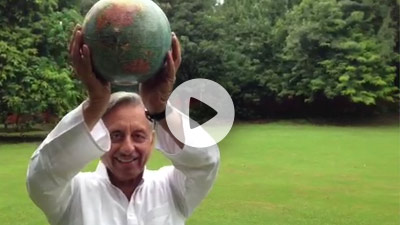'A very little key will open a very heavy door'
Charles Dickens
The United Nations Open Ended Working Group on Taking Forward Multilateral Nuclear Disarmament Negotiations wrapped up its work on Friday 30 August by adopting a report to present to the United Nations General Assembly in October this year as requested by UN General Assembly resolution A/RES/67/56 of 3 December 2012.
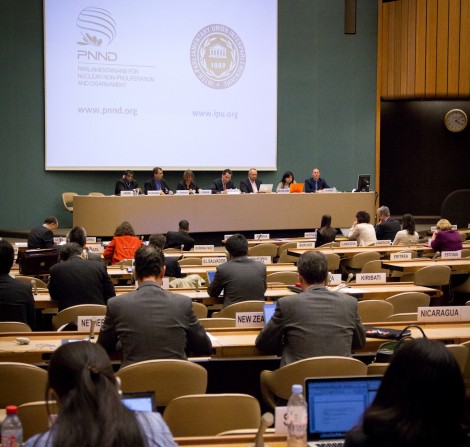
Session of the UN Open Ended Working Group on the role of parliamentarians
The 15 full days of deliberations in the Palais de Nations in Geneva by approximately 80 countries (and a number of non-governmental organisations), spread over May, June and August 2013, focused on a range of issues relating to ‘taking forward multilateral nuclear disarmament negotiations for the achievement and maintenance of a world without nuclear weapons’, which are reflected in the report, including:
- Approaches on how to take forward multilateral nuclear disarmament negotiations;
- Elements to consider in taking forward multilateral nuclear disarmament negotiations;
- Reviewing the role of nuclear weapons in the security context of the XXI century;
- The role of international law;
- The role of States and other actors;
- Other practical actions that could contribute to take forward multilateral nuclear disarmament negotiations for the achievement and maintenance of a world without nuclear weapons
Last minute amendments to the draft report mean that the final text of the report is not yet available online in official UN form. However, the penultimate draft is available in two parts at:
- Revised draft final report (except chapter IV);
- Final draft report Chapter IV.
The report reflects the success of the OEWG to build bridges between contrasting approaches and perspectives that have prevented progress on multilateral nuclear disarmament negotiations for the past 1 ½ decades (and allowed only minimal steps to be achieved prior to this).
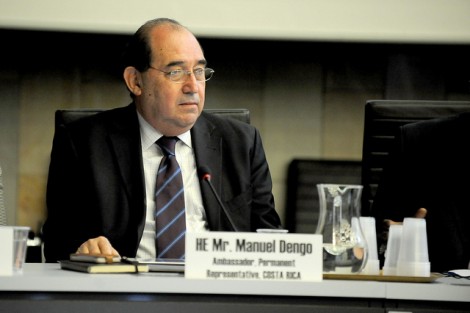
H.E. Manuel Dengo, Chair of the UN Open Ended Working Group
In particular, delegations showed a new flexibility to consider and develop proposals that encompassed aspects of both the step-by-step approach and the comprehensive approach, in order to outline hybrid approaches that could build common support – such as a building blocks approach or a legally binding framework comprising mutually reinforcing components backed by clearly defined timelines and benchmarks. (The nuclear weapons convention and ban treaty proposals were considered in the context of these different approaches).
In addition, the OEWG discussed core security frameworks that currently prevent nuclear weapons States and those under extended nuclear deterrence doctrines from agreeing to significant nuclear disarmament measures – and highlighted the need for additional work to identify specific roles for currently ascribed to nuclear weapons and to advance non-nuclear alternatives to these.
Other focus areas - including the elements of a nuclear weapons free world, the role of law and the roles of differing actors - provided considerable substance for concrete action to be taken by governments and civil society in a range of forums.
One delegate noted that the rich, informative and constructive dialogue and exploration that occurred in the OEWG had until now only taken place in academic or NGO circles. The fact that governments are now deliberating on these issues in an interactive UN Forum has opened the door to progress.
The adoption of the report was not without incident or difficulties, as was expected when such a wide range of governments is deliberating on key security issues. Intense back-room consultations, creative diplomacy and flexibility by delegations on the final text was required in order to achieve agreement – with the meeting having to be extended beyond UN hours to achieve this.
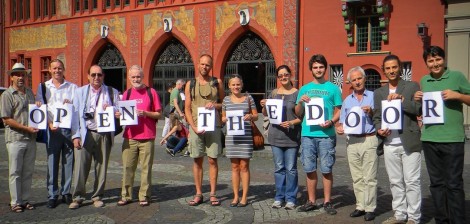
Ambassador Manuel Dengo with students from the World Peace Academy in front of the Basel Rathaus
Credit must be given to the Chair of the UN OEWG, Ambassador Manuel Dengo, for facilitating such a successful forum, opening the door to meaningful deliberations amongst governments, providing for NGO input in a meaningful way not seen in other multilateral disarmament forums, and facilitating successful negotiations to be able to move the OEWG to adopt the report.
Attention should now move to the UN High Level Meeting in New York on 26 September and the UN General Assembly First Committee in New York from 7 October – 5 November, where governments should be encouraged to highlight the OEWG and support a renewal of its mandate in order to continue and extend its deliberations on taking forward multilateral nuclear disarmament negotiations.
In order to encourage the delegations to deliberate and negotiate in good faith, Open the door videos from around the world were shown by Abolition 2000 Task Force members in the UN lobby just outside the OEWG meeting room throughout the two weeks of the August sessions of the OEWG.
Indian parliamentarian Mani Shankar Aiyar, Chair of the Rajiv Gandhi Action Plan Group for a Nuclear Weapons Free World, submits an Open the Door video
The Open the door compilation video was shown on the main screen in the meeting room at the start of one of the meetings.
For more information see:
- Abolition 2000 Task Force on the UN OEWG;
- Open the door campaign;
- UN OEWG official website;
- Contributions of Abolition 2000 Task Force members to the OEWG (including working papers);
- PNND/MPI Framework Forum event on the OEWG;
- Manual for Campaigners.
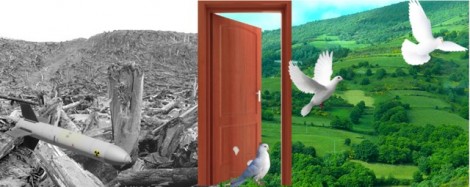
Open the door image by Colleen Ring, Canada

